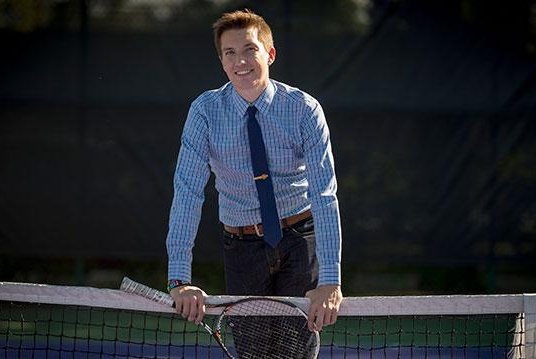Researcher Tyler Scaletta is working to find out whether tennis players are antisocial by nature, or made that way by hyper-competitive conditions. Photo by Northwestern University
CHICAGO, Dec. 10 (UPI) -- Previous studies have suggested tennis players are antisocial by nature. But researcher Tyler Scaletta -- a former tennis player and coach, now a senior at Northwestern University -- thinks the socialization of competitive junior tennis programs may be to blame. In other words, he says it's nurture not nature.
Scaletta is working with fellow undergraduate Julian Matra, a psychology major, to test his hypothesis.
Previous research is limited and mostly anecdotal, Scaletta says. With Matra's help, Scaletta is taking a more scientific approach to observing and measuring the behavioral tendencies of young tennis players.
Scaletta and Matra collected data on the behavior of young baseball and tennis players in order to see how their environments might influence their temperament.
The researchers are still analyzing their results, but Scaletta says the survey results show tennis players tend to have more issues with social anxiety.
"Our surveys included psychological measures and lifestyle questions to give us data about social anxiety disorder, demographics and specific incidents of tennis habits creeping into social situations," Scaletta said in a recent interview.
Tennis players were more likely to report a variety of social anxiety symptoms.
"They range in severity: reluctance to talk to a new person, feelings of physical stress about social interactions, not being able to talk on the phone or make eye contact," he said.
Scaletta says he didn't experience social anxiety problems growing up. He credits his parents, who encouraged him to participate in a variety of activities. But researchers say competitive junior tennis players are forced to dedicate themselves entirely to the solitary sport in order to advance. That means many hours working and preparing without the moral support of a team environment.
"It's cutthroat. Your best friend, maybe your only friend, could become your opponent at any time," Scaletta said. "Add to that overzealous parents and coaches, and the physical and psychological toll, and tennis can be seriously stunting to the social development of a young player."
Scaletta hopes his research will encourage parents, coaches and kids to pay greater attention to the psychological and social consequences the sport may cause among young -- especially hyper-competitive -- participants.
"I care about kids playing this sport, and it bothers me to think that they might feel alone or lost," Scaletta said.















